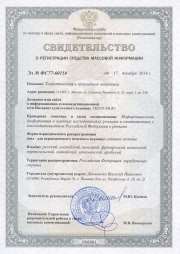MAIN PAGE
> Back to contents
Publications of Rabkin Sergei Vladimirovich
|
National Security, 2020-4
|
|
Rabkin S.V. - New institutional challenges to the educational space: security as a criterion for development in the conditions of digitalization
|
|
pp. 81-93
|
DOI: 10.7256/2454-0668.2020.4.33750
Abstract: The subject of this research is the institutional transformations of educational space associated with the global processes of digitalization of social relations, as well as internal factors in cooperation between society and the state with regards to determination of the criteria of security for their development. Using the general methodology of institutional analysis, methods of analogy and summary, as well as interdisciplinary approach towards studying the educational space, the author considers the questions of implementation of digital education technologies under the conditions of current sociocultural transformations. Special attention is turned to the balance between rational and immaterial factors that affect the formation of modern educational space, and thereby, specification of the new institutional challenges to the security of social development. The conducted analysis of the problems of implementation of such technologies in the system of higher education leads to the conclusion on the need for assessing the effectiveness of implementation of digital technologies in accordance with the institutional criteria that imply not only the impact of both, rational and immaterial factors of social development. The institutional nature of these factors is insufficiently studied, however determines the possibility of application of cognitive models in solution of the tasks aimed at ensuring national security in the conditions of digitalization of sociocultural processes. Therefore, the crucial institutional criterion that defines the effectiveness of implementation of digital technologies in the educational space consists in its security in all regards. The proposed institutional-criteria approach allows the state and society to focus on ensuring security of the educational space in the context of solution of relevant tasks of ensuring national security of the Russian Federation.

|
Trends and management, 2019-2
|
|
Rabkin S.V. - Social entrepreneurship: modern trends and new objectives in ensuring the economic security of the Russian Federation
|
|
pp. 27-35
|
DOI: 10.7256/2454-0730.2019.2.23712
Abstract: The subject this research is the modern trends in transformation of the role of social entrepreneurship with regards to providing institutional guarantees of economic security. The article focuses on the development of the forms of social entrepreneurship; effects of rational and irrational factors on this process; interaction between business and government in the model of social governance; peculiarities of achieving potential of social entrepreneurship in solution of the issues regional development; as well as specificity of emergence of new vectors in development of social entrepreneurship. One of such vectors of social entrepreneurship in the regions is the solution of transport accessibility of the territory. Leaning on the universal methodology for institutional analysis and theory of the "institutional traps", the author concludes on the need for expanding the scope of activities of social entrepreneurship based on implementation of the national development priorities and gradual transition from the model of social governance towards the model of social regulation. The author emphasizes the need for development of social entrepreneurship in the context of building and operation of transport infrastructure in the regions, as well as sanitary and specialized aviation. The author proposes to legislate the scope of activities of social entrepreneurship at the regional level based on the objectives for improving the quality of life of the population and achieving the economic growth outlined in the National Security Strategy of the Russian Federation.

|
National Security, 2017-3
|
|
Rabkin S.V. - Arctic macroregion: search for the new institutional model of relationship between the Federal Center and regions
|
|
pp. 21-33
|
DOI: 10.7256/2454-0668.2017.3.21668
Abstract: The subject of this research is the formation of a new institutional model of relationship between the Federal Center and regions aimed at realization of the national development priorities in the Arctic macroregion. The article examines such aspects as the current directions of development of the Russian federalism model and implementation of the state regional policy, development of the system of strategic planning, institutionalization of the criteria that ensure economic security on the regional level. The institutional basis of territorial development in the Russian Arctic zone is defined by the criteria of ensuring economic security at the regional level, established by the new amendment to National Security Strategy of the Russian Federation. Leaning on the methodology of institutional analysis alongside the methods of political regional studies, the conclusion is made about the need for improving the regional policy and shifting towards the horizontal integration model. For the purpose of increasing efficiency of regional development strategic planning, the author suggests returning to the practice of elaboration of the scientifically substantiated schemes of development and allocation of the productive forces of the territories. The article underlines the need for coordinating the socioeconomic programs of development of constituents of the Federation based on the general concept of macro-regional development, including the realization of transport accessibility of the Russian Arctic Zone of the Federation and the adjacent territories.

|
National Security, 2015-6
|
|
Rabkin S.V. - Peculiarities of the formation of RussiaТs national security strategy: certain historical lessons of the World War I
|
|
|
DOI: 10.7256/2454-0668.2015.6.12991
Abstract: The subject of this research is the historically substantiated factors that define the institutional principles of structuring Russia’s national security strategy. Changing the institutional structure of relations between countries, the First World War has significantly influenced the creation of systems for ensuring their own national security. Similar trends are characteristic for the modern development of society. Global economic and political crises give rise to the new institutionalization of criteria of economic security, forming a corresponding system its insurance, thus changing the institutional foundation of economic relation between nations. Therefore, there is a need to analyze the role of the state in the regulation of strategic branches of economy as the basis for efficient system of realization of national development priorities with consideration of historical traditional of formation of geopolitical interests. Use of the method of historical analogies within the framework of general methodology of institutional analysis forms a more optimal structure of the research of “immaterial” factors affecting the economic security of the state. The institutional approach towards research of this issue allows concluding that the solution for the historically identified for Russia paradigm of search for state interest within the “material” and “immaterial” wealth is directly linked with the formation of qualitatively new system of realization of the guarantees of economic security.

|
Genesis: Historical research, 2015-5
|
|
Rabkin S.V. - Reforms Kosygin: the historical aspect of the search immaterial factors of institutional development
|
|
pp. 29-50
|
DOI: 10.7256/2409-868X.2015.5.15813
Abstract: The subject of study is the impact of immaterial factors of economic development for implementation the reforms of Kosygin. The article deals with scientific issues such as the causes and consequences of the reforms, the problems of the Russian Economic School, the implementation of the model interaction between the center and regions, forming basic enterprises and strategic industries of the economy. Indicated on the institutional nature of the changes and their historical significance, in terms of the formation of the modern scientific and practical approach to economic reform. On an example formation of transport infrastructure Republic of Komi defined the mechanism of implementation of the soviet management model by the economic development of regions.Based on the method of historical analogy and methodology of institutional analysis, concludes the need to consider the impact of immaterial factors of economic development during the current economic reforms. These factors contributed to the no implementation of reform Kosygin. However, in the long term, policy reforms revealed new opportunities for the development of the Russian Economic School, created the prerequisites for the formation basic enterprises and strategic industries, identified the institutional problems relations between the federal center and the regions in future. Therefore, it is essential to use the historical experience of these reforms in the formation system of economic security and national priorities of modern Russia.

|
Rabkin S.V. - Strategic industries and guarantees of economic security: the search for a new model of industrialization
|
|
pp. 1-17
|
DOI: 10.7256/2409-7543.2014.6.14710
Abstract: The object of this study includes the strategic economic sectors as the most important elements of economic security. The article considers the issues of interrelation between the theory and the practice of reform of state regulation of economy, the interaction between the state and the largest corporations in the strategic sectors of economy, the influence of irrational factors on the choice of a new model of industrialization. The author indicates the general trend of the changing role of the state in determining the sectoral development priorities, regardless of the chosen model of economic development. Particular attention is paid to the analysis of the influence of rational and irrational factors on the formation of a system of industry regulation and the resolution of dilemma «market or nonmarket». On the base of the method of historical analogy and methodology of institutional analysis the author concludes about the necessity of modernization of strategic economic sectors as a basis for economic security. The proposed approach complements the system of assessment threshold values of economic security and creates a real opportunity to avoid a state of "institutional trap" of a new industrialization. For modern Russia it is fundamentally important to return the state to the real economy and to create certain points of economic growth, where the technological breakthrough is possible. The transition to the integrated forms of modernization of strategic economic sectors will allow specialization of national priorities of development in terms of institutionalizing of guarantees for their implementation.

|
Genesis: Historical research, 2014-5
|
|
Rabkin S.V. - Russian Economic School: the Concept of Immaterial Wealth as an Institutional Factor for Formation of the National Model of Economic Security
|
|
pp. 1-16
|
DOI: 10.7256/2306-420X.2014.5.13508
Abstract: Formation of model of economic security of modern Russia is connected with reconsideration of its historical heritage. The domestic school of economy in many respects predetermined threats and calls of future development. Economic works, A. L. Ordin-Nashchokina, V. N. Tatishcheva, I. T. Pososhkova, M. V. Lomonosov and many other Russian economists it isn't acquitted forgotten in the conditions of market transformations of the Russian economy, force to estimate an essence of the happening institutional changes differently. The concept of "immaterial wealth" which is put forward by them defines a strategic vector of development of the Russian economy within own model of ensuring national security. Based on a method of historical analogies and the general methodology of the institutional analysis, the scientific hypothesis of historically caused influence of "immaterial" factors on formation of system of economic security of Russia is made. The concept "safety" is connected with accurate definition of priorities of economic development where the purposes of future development prevail over rational perception of economic reality. Actually it is search of "immaterial" factors in the "material" guarantees of economic development characterized by a modern scientific paradigm "rational vs irrational". Permission of this question within the created tradition of domestic school of economy allows to prove a role of strategic branches of economy as most important institute of providing economic security of the Russian Federation.

|
Rabkin S.V. - Economic security as an institutional base for modernization of strategic sectors of economics of Russia and China
|
|
pp. 63-74
|
DOI: 10.7256/2409-7543.2014.5.14030
Abstract: Creation of an effective model of modernization of national economy is one of the key prerequisites of the formation of modern guarantees of economic security provision. State regulation of the strategic sectors of economics becomes one of the terms of creation of an integrated model of modernization. The experience of reforms in Russia and China indicates the necessity of a distinct definition and realization of the national priorities of sectoral development. Thereby the modern challenges and threats to the national economic systems can be neutralized by the advance development of the key sectors of economics. Such actions destroy the unipolar model of the world economic relations and create the grounds for a new economic system of mutually beneficial cooperation. On the base of the general methodology of the institution analysis the author comes to the conclusion about a possibility of the transition from the catching-up model of modernization to the integrated one, which is based on the strategic sectors of economics as a “new industry”. The realization of this approach can be considered within the creation of intergovernmental economic alliances, promoting the development of the corresponding sectoral groupings. Grouping of the strategic sectors of economics can be variable and consisting of different combinations of sectors. So from the viewpoint of economic security provision and the national priorities of development realization, the cooperation between Russia and China in aircraft and infrastructural objects building can be one of the most important areas of this alliance development.

|
Rabkin S.V. - Airfield complexes in northern cities: institutionalizing the criteria for modern development
|
|
pp. 34-49
|
DOI: 10.7256/2310-8673.2014.2.13466
Abstract: The development of airfield complexes in northern cities is a necessary condition for forming a universal territorial space of Russian Federation. The strategic tasks of exploring the Russian part of the Arctic region define the high priority of this vector. However, a return to strategic planning principles for regional development demands efficient mechanisms for their implementation, while taking into account the institutional changes in the economy's structure. As this research suggests, among the major problems, the issues of modernization of airfield complexes located within city borders stand out. By the example of the Republic of Komi, the author examines the regional aspects if airline deregulation. Basing on the method of institutional analysis, the author elaborates on the necessity of further examining the concepts of transport accessibility and security, taking into account the trends in their institutionalization at the present time. The use of methodology of institutional systemic synthesis allows to envision the indicators that characterize sectoral security as institutional criteria for defining the national priorities of development. The stated approach may be employed when forming regional polycentric systems of transport infrastructure object placement. Attention is drawn to the role of airfield complexes in ensuring economic security and in ongoing urbanization of the Russian North.

|






